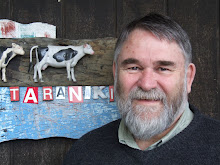 These were observations made at the beginning of a recent creativity workshop that I facilitated. Used with permission.
These were observations made at the beginning of a recent creativity workshop that I facilitated. Used with permission."I am in a large room surrounded by the efforts of creative people – art, craft, musical instruments, books. A discussion is in full swing. There are several groups of people. In the group I am observing there are two engineers, a coffee shop manager, an artist, a community worker and a manger of a service business. They are part of a creativity workshop. They have been on ‘a poster walk’ to find a quote about creativity that attracts their attention. This is the beginning of a one day creativity workshop facilitated by Wayne Morris.
One of the engineers chose an Albert Einstein quote: “The intuitive mind is a sacred gift and the rational mind is a faithful servant. We have created a society that honours the servant and has forgotten the gift.” He explained that engineering needed both but that it was the rational mind that was rewarded. The other engineer chose a quote by Edward de Bono: “There is no doubt that creativity is the most important human resource of all. Without creativity, there would be no progress, and we would be forever repeating the same patterns.” He went on to explain that everything new, every new development, came from the mind of a creative person and then went on to wonder why creativity is so poorly supported in our education system given its importance to our future. The coffee shop manager put forward a strong case for her selection – a quote from Robert Fritz: “The one fundamental choice – to be the predominant creative force in your life – is a foundation for the entire orientation of the creative.” She argued that we each have a responsibility for ‘creating’ our own lives and without that we become victims of other people’s decisions. It was a passionate argument peppered with her own experiences. The artist favoured Picasso who said “I am always doing that which I can not do, in order that I may learn how to do it.’ She explained that an artist, perhaps any creative person is always on the edge, pushing the boundaries of their competence and not always succeeding which led to a quick discussion on the role of failure in creativity. The manager interrupted with a story from his experience around failure and contributed a quote from Margaret Wheatley: “The things we fear most in organizations -- fluctuations, disturbances, imbalances -- are the primary sources of creativity.” He explained that in his experience people sometimes had to be challenged to go beyond their comfort zones to get the creative juices flowing. Most nodded in agreement. The final quote was offered by the community worker. He supported one offered previously by reading his de Bono quote: “In today’s world creativity is fundamentally important for our personal, social, economic and cultural well-being. The most important developments in civilization have come about through the creative process.”
The animated discussions – this was just one of 3 groups - continued for several minutes until Morris called for the groups attention. “We have a day together to create”, he said, “so lets take some time to look at your creative journey – where it has come from, where is it now and more importantly, where do you want it to go?” I left thinking that I will do the next workshop. I need more life in my creativity and judging by the excitement in the room this may well be the place to find it."


No comments:
Post a Comment